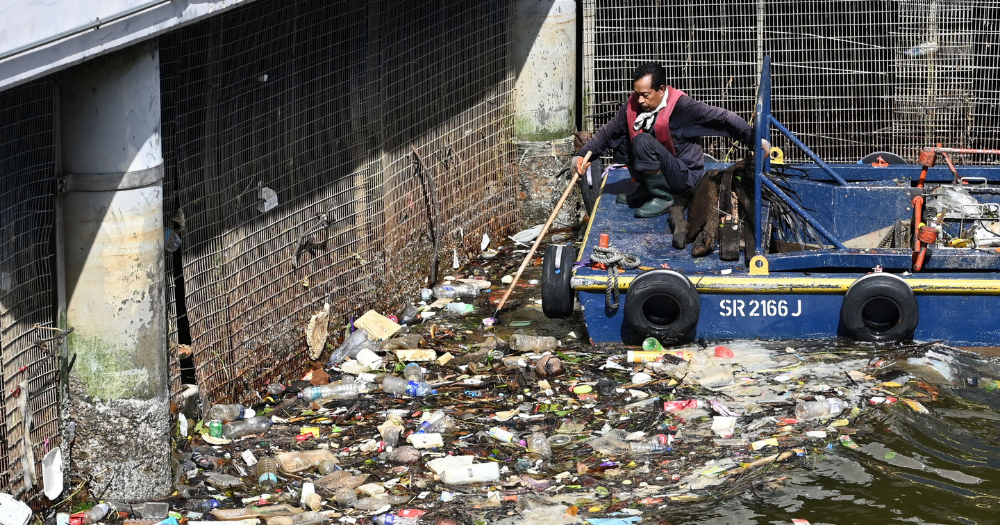Follow us on Telegram for the latest updates: https://t.me/mothershipsg
The Progressive Wage Model (PWM) will be expanded to include the waste management sector. This will benefit up to 3,000 more local workers.
Previously, the PWM covered only the cleaning, security, landscape, and lift and escalator sectors, according to the Jan. 26 press release.
A quick recap of what the PWM is
According to the Ministry of Manpower (MOM), the PWM "helps to uplift" low-wage Singapore citizen and permanent resident workers working in the cleaning, security, and landscaping sectors.
The PWM requirements first took place for these three sectors in 2015 (for cleaning) and 2016 (for security and landscaping), and was then expanded to the lift and escalator sector in 2018.
The PWM spells out the minimum wage that must be paid to workers in specific industries, as well as the required wage increases that workers must be given as they progress in their careers.
According to MOM, the PWM maps out a career pathway for a worker's wages to rise along with training and improvements in productivity and standards, and also provides a recommended minimum and maximum wage ratio within each job tier.
Developing PWM for waste management sector
The expansion of the PWM to the waste management sector will cover and benefit up to 3,000 local workers.
According to an MOM press release, this expansion was first proposed by the National Trades Union Congress (NTUC) in 2020, and is a first step in the broader effort by the Tripartite Workgroup for Lower-Wage Workers (TWG-LWW) to "develop a multi-year roadmap to uplift the employment outcomes and well-being of lower-wage workers".
MOM said:
"Similar to the PWMs in Cleaning, Security, Landscape, and Lift & Escalator sectors, the Waste Management PWM will provide a clear career progression pathway for workers in the sector to earn better wages as they improve their skills and productivity."
The Tripartite Cluster for Waste Management (TCWM) has been formed to oversee the implementation of the PWM for the waste management sector.
Tripartite Cluster formed
The TCWM — which will be chaired by Member of Parliament (MP) and Director of Operations and Mobilisation at NTUC Fahmi Aliman and co-chaired by Deputy Honorary secretary of Singapore National Employers Federation Felix Loh — will be made up of representatives from service buyers, service providers, unions, and government agencies.
The TCWM's job is to develop the job ladders, training requirements, and wage benchmarks of the PWM.
In the process, it will consult multiple parties with interests, in order to make sure that the PWM is tailored to the unique conditions of the waste management system and benefits all concerned, MOM said.
These benefits include workers being able to improve their skills and enjoy higher wages, employers raising the productivity of their operations, and service buyers enjoying improved services, according to MOM.
The TCWM aims to issue its recommendations for the PWM in the second half of 2021.
PWM vs. minimum wage
The PWM has been a hotly-debated topic in the past year, particularly in the weeks leading up to the 2020 General Election and the months afterward in Parliament.
In particular, the Workers' Party (WP) has pushed for a minimum wage policy.
In the GE2020 political debate on Jul. 1, 2020, WP MP Jamus Lim had said that policies such as a minimum wage would help increase social mobility.
In a Facebook post on Jul. 14, 2020, Lim critiqued the PWM, saying that by tying wages to job function, the PWM gives employers too much room to cut corners, without correcting power differences:
"It also leaves those who simply cannot upskill in the lurch, and earning below a living wage.
The reality is that, by our estimates, 100,000 workers remain below the min wage, and so PWM is obviously not working for these people."
Leader of the Opposition and WP Secretary-General Pritam Singh shared his thoughts on the matter on Facebook on Oct. 12, 2020 saying that the sectoral approach that the government has undertaken is taking "too long" to implement.
He suggested that the government explore a "parallel endeavour" of implementing a universal minimum wage of S$1,300, to complement the efforts of exploring ways to improve productivity and wages in various sectors.
Government not ideologically opposed to minimum wage
In Parliament on Oct. 15, 2020, Deputy Secretary-General of NTUC and Senior Minister of State for Health Koh Poh Koon clarified that the government is "not ideologically against" a minimum wage.
Koh emphasised that the idea of having "some form of a minimum wage" is not new, and that the government shares the WP's objective of uplifting the incomes of low wage workers, although they may differ in the approach to getting there.
He said that the problem with a blanket minimum wage is that it is difficult to ascertain the right figure for all sectors, as setting it too low would limit the benefit to workers, while setting it too high could mean that businesses may not be able to pay their workers' wages.
Read more here:
Totally unrelated but follow and listen to our podcast here
Top photo by ROSLAN RAHMAN/AFP via Getty Images.
If you like what you read, follow us on Facebook, Instagram, Twitter and Telegram to get the latest updates.
